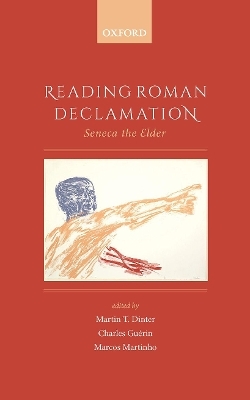
Reading Roman Declamation
Oxford University Press (Verlag)
978-0-19-874601-0 (ISBN)
Situated at the crossroads of rhetoric and fiction, the genre of declamatio offers its practitioners the freedom to experiment with new forms of discourse. This volume places the literariness of Roman declamation into the spotlight by showcasing its theoretical influences, stylistic devices, and generic conventions as related by Seneca the Elder, the author of the Controversiae and Suasoriae, which jointly make up the largest surviving collection of declamatory speeches from antiquity.
Authored by an international group of leading scholars of Latin literature and rhetoric, the chapters explore not only the historical roles of individual declaimers, but also the physical and linguistic techniques upon which they collectively drew. In addition, the 'dark side of declamation' is illuminated by contributions on the competitiveness of the arena and the manipulative potential of declamatory skill and, in keeping with the overall treatment of declamation as a literary phenomenon, a section has also been dedicated to intertextuality. Drawing on thought-provoking analyses of Seneca the Elder's works, the volume highlights the complexity of these texts and maps out, for the first time, the socio-cultural context for their composition, delivery, and reception, as well as providing a comprehensive, innovative, and up-to-date treatment of Roman declamation that will be essential for both students and scholars in the fields of Latin literature, Republican Roman history, and rhetoric.
Martin T. Dinter is Senior Lecturer in Latin Language and Literature at King's College London. He is the author of Anatomizing Civil War: Studies in Lucan's Epic Technique (University of Michigan Press, 2013) and editor of The Cambridge Companion to Roman Comedy (CUP, 2019), as well as the co-editor of A Companion to the Neronian Age (with Emma Buckley; Wiley-Blackwell, 2013) and two other volumes on Roman declamation: Reading Roman Declamation: The Declamations Ascribed to Quintilian (with Charles Guérin and Marcos Martinho; De Gruyter, 2016) and Reading Roman Declamation: Calpurnius Flaccus (with Charles Guérin and Marcos Martinho; De Gruyter, 2017). He has also written articles on Roman drama, Roman epic, and epigram, and is currently working on a book on Cato the Elder. Charles Guérin is Professor of Latin Literature at Sorbonne Université, Paris. He has published monographs on the rhetorical notion of persona (J. Vrin, 2009; J. Vrin, 2011) and on witness testimony in the Roman courts of the first century BC (La Voix de la vérité; 2015), and has also edited and co-edited several volumes on ancient rhetoric, oratory, declamation, and literature. A former junior member of the Institut Universitaire de France, he is a member of the council of the International Society for the History of Rhetoric (2018-2021) and the executive committee of L'Année Philologique. Marcos Martinho dos Santos is Associate Professor of Classical Languages and Literatures at the University of São Paulo, Brazil. He is a specialist in ancient rhetoric and in addition has published extensively on ancient grammarians and mythographers. He also serves on the editorial boards of nine Classics related journals and has edited and co-edited six volumes on Roman declamation, Cicero, and Greek mythology. He is currently preparing a book length study on Hyginus.
Martin T. Dinter and Charles Guérin: Introduction: What is Declamation?
I. Declaimers and Declamation
1: Yelena Baraz: The Bitter Medicine of History: Seneca the Elder on the Genre of Declamation
2: Martin T. Dinter: Seneca and the Past
3: Charles Guérin: Greek Declaimers, Roman Context: (De)constructing Cultural Identity in Seneca the Elder
4: Orazio Cappello: Nomination and Systematization in Seneca's Controversiae
II. Physical Technique: Actio
5: Anthony Corbeill: Physical Excess as a Marker of Genre in the Elder Seneca
6: Andrea Balbo: Between Real and Fictional Eloquence: Some Observations on actio in Porcius Latro and Albucius Silo
III. Linguistic Technique: Motifs and Devices
7: Bart Huelsenbeck: The Ocean (Seneca Suas. 1): Community Rules for a Common Literary Topic
8: Beatrice Larosa: The Mythical exempla of Faithful Heroines in Seneca the Elder's Work: Literary Occurrences of a Declamatory Device
9: Chris van den Berg: The Rhetoric of Decline and the Rhetoric for declamatio
IV. The Dark Side of Declamation
10: Jonathan Mannering: Objection! Contesting Taste and Space in Seneca's Declamatory Arena
11: Yazmín Victoria Huerta Cabrera: Color Medius or the Colour of Suspicion
12: Catherine Schneider: Laughing is no Laughing Matter: Laughs and Laughter in Seneca the Elder's Oeuvre
V. Intertextuality
13: Julien Pingoud and Alessandra Rolle: Intertextuality in Seneca the Elder
14: Stefan Feddern: The Use of the Apostrophe: A Sign of the Fictionality of Declamation?
15: Danielle van Mal-Maeder: Controversial Games: Didactical Voices and the Construction of Discourse in Seneca's Controversiae and Suasoriae
| Erscheinungsdatum | 30.09.2020 |
|---|---|
| Verlagsort | Oxford |
| Sprache | englisch |
| Maße | 147 x 223 mm |
| Gewicht | 572 g |
| Themenwelt | Sachbuch/Ratgeber ► Beruf / Finanzen / Recht / Wirtschaft ► Briefe / Präsentation / Rhetorik |
| Geschichte ► Allgemeine Geschichte ► Vor- und Frühgeschichte | |
| Geschichte ► Allgemeine Geschichte ► Altertum / Antike | |
| Geisteswissenschaften ► Sprach- / Literaturwissenschaft ► Anglistik / Amerikanistik | |
| Geisteswissenschaften ► Sprach- / Literaturwissenschaft ► Literaturwissenschaft | |
| ISBN-10 | 0-19-874601-6 / 0198746016 |
| ISBN-13 | 978-0-19-874601-0 / 9780198746010 |
| Zustand | Neuware |
| Informationen gemäß Produktsicherheitsverordnung (GPSR) | |
| Haben Sie eine Frage zum Produkt? |
aus dem Bereich


